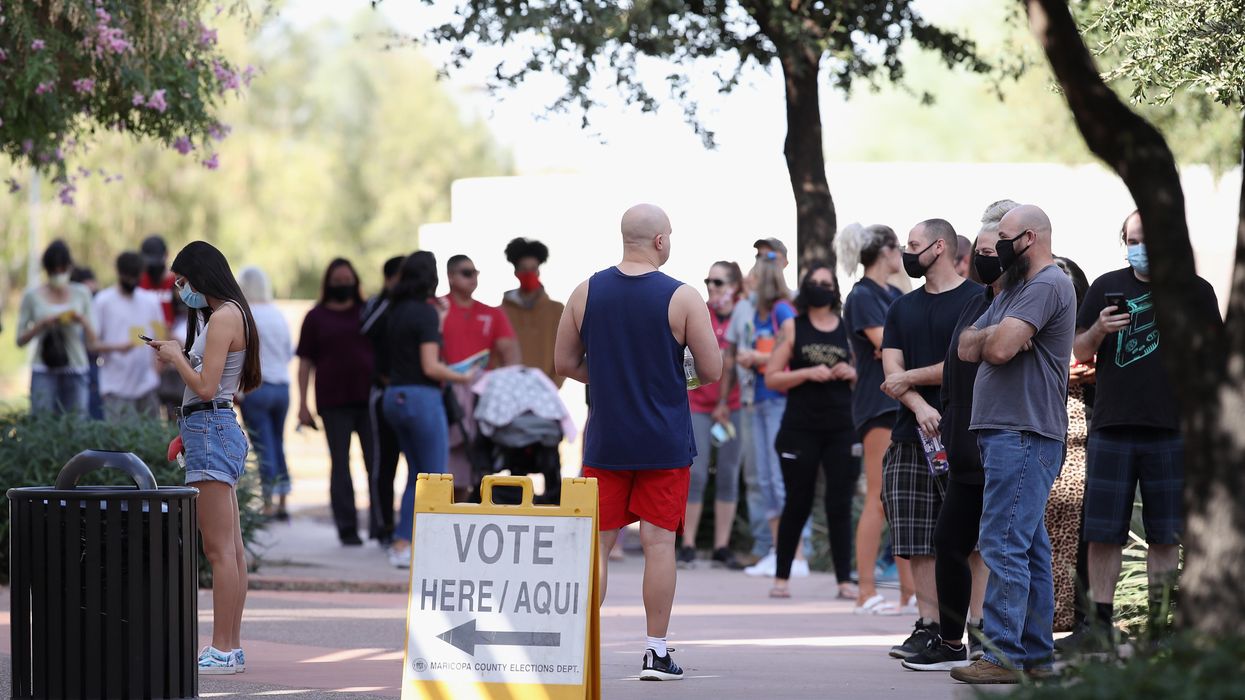Efforts to make voting more complicated have lurched forward this week in the Republican-run legislatures of three additional major partisan battlegrounds.
The Arizona House voted Tuesday to purge inconsistent voters from the roster of people who are sent a mail-in ballot before every election. Hours later in Florida, a Senate committee advanced a package of fresh restrictions on voting. And GOP powers in Ohio put the finishing touches on their own multifaceted plan to make access to the ballot box more difficult.
Business executives have joined Democrats and civil rights advocates to excoriate all those efforts as aiming to disenfranchise voters of color — an argument that has not stopped fresh curbs from being enacted this year, in the name of bolstered election security, in purple states from Georgia to Iowa and most recently Montana.
These are the details of the developments in the states with the freshest legislative activity:
Arizona
The measure is now one roll call, in the GOP-run Senate, away from the desk of Republican Gov. Steve Ducey.
The vote in the House was 31-29 along party lines, promoted mainly by Republicans who have continued to push the evidence-free allegation that fraud cost former President Donald Trump the state's 11 electoral votes last year.
Under their bill, people who don't return any ballot for any election for four years would be dropped from the roster of voters — which now includes three-quarters of Arizonans — who receive vote-by-mail packets before each election. (They would first get a warning they have 90 days to ask to stay on the list.)
About 200,000 voters, or one in five, sat out the primary and general elections in both 2018 and 2020 and would be subject to the purge. Republicans say the measure is justified to keep not-completed ballots out of the wrong hands. Democrats say the result would be confusion and ultimately suppression — especially of Latinos, Native Americans, young people and partian independents.
Greater Phoenix Leadership, a business group, and more than 50 company executives including the owner of the Arizona Cardinals have come out against the bill and two others that have not advanced as far in the Legislature, one to shrink the period for mail-in voting and the other to stiffen proof-of-identification requirements for those using the forms.
"These measures seek to disenfranchise voters. They are 'solutions' in search of a problem. They are attempts at voter suppression cloaked as reform — plain and simple," they said in an open letter last week, warning that passage could taint the state's reputation as a good place to live and work.
President Biden was the first Democrat to carry the state in six elections, albeit by just 10,000 votes out of 3.3 million cast, and after the November election Arizona has two Democratic senators for the first time since 1968.
Florida
The Senate Rules Committee approved the bill, 10-7. One Republican joined every Democrat in opposing it, despite GOP sponsors abandoning some of the more aggressive ideas in their original package — including intensified signature-matching rules for voters and an outright ban on drop boxes.
Instead, the bill would make drop boxes available only during early voting hours, not around the clock. It also would bar political operations from delivering water to voters within 150 feet of a polling place, add more ID requirements to vote-by-mail applications, end the ability of voters to be on a permanent roll to receive an absentee ballot for each election, limit third-party collections of ballots and boost the powers of partisan observers during vote tabulation.
As in other states, the debate was between Republicans who said they wanted to prevent cheating that otherwise "could happen," and Democrats who said that warding off a hypothetical was much less of a problem than suppressing the vote.
As approved, the measure is quite similar to a bill awaiting a vote in the Republican-majority House. But unless identical language wins passage in both chambers by the end of next week, when the Legislature adjourns, no voting bill will be presented to GOP Gov. Ron DeSantis this year. Florida has for a decade been considered the biggest purple state, but Republicans have won every topflight statewide contest in the past five years.
Ohio
Republican legislators and GOP Secretary of State Frank LaRose say they are close to unveiling an election law overhaul proposal they believe can win bipartisan backing.
But a draft of the legislation that circulated last week prompted state House Democtatic Leader Emilia Sykes to send out a fundraising email describing the bill as "so draconian that the Georgia law looks mild in comparison."
That draft would ban ballot drop boxes, require two forms of ID to vote early or by mail, and eliminate early-in person balloting the Monday before the election. But negotiators say they are also considering a collection of proposals to ease voting, including a new online system and a later deadline to apply for an absentee ballot.
One draft version would prohibit the state from paying the postage on returned absentee ballots. Another would mandate postage-paid envelopes with all ballot request forms and ballots.
Unlike many other states, the Ohio Legislature meets all year — so there is plenty of time to alter rules ahead of the next election, when the marquee race in Ohio will be for an open, now-Republcian-held Senate seat. Trump secured its 18 electoral votes twice, meaning last year was the first time since 1860 that Ohio did not vote for the presidential victor.




















Trump & Hegseth gave Mark Kelly a huge 2028 gift